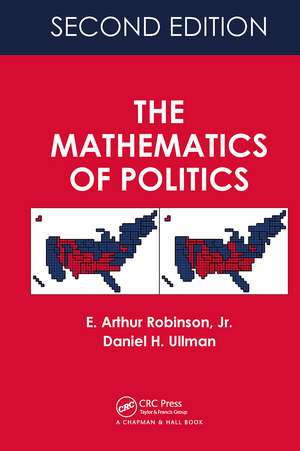The Mathematics of Politics
Autor E. Arthur Robinson, Daniel H. Ullmanen Limba Engleză Paperback – 21 ian 2023
believed it has nothing to say about politics. The high school
experience with mathematics, for so many the lasting impression
of the subject, suggests that mathematics is the study of numbers,
operations, formulas, and manipulations of symbols. Those
believing this is the extent of mathematics might conclude
mathematics has no relevance to politics. This book counters this impression.
The second edition of this popular book focuses on mathematical reasoning
about politics. In the search for ideal ways to make certain kinds
of decisions, a lot of wasted effort can be averted if mathematics can determine that
finding such an ideal is actually impossible in the first place.
In the first three parts of this book, we address the following three
political questions:
(1) Is there a good way to choose winners of elections?
(2) Is there a good way to apportion congressional seats?
(3) Is there a good way to make decisions in situations of conflict and
uncertainty?
In the fourth and final part of this book, we examine the Electoral
College system that is used in the United States to select a president.
There we bring together ideas that are introduced in each of the three
earlier parts of the book.
| Toate formatele și edițiile | Preț | Express |
|---|---|---|
| Paperback (1) | 308.52 lei 6-8 săpt. | |
| CRC Press – 21 ian 2023 | 308.52 lei 6-8 săpt. | |
| Hardback (1) | 597.59 lei 6-8 săpt. | |
| CRC Press – 16 noi 2016 | 597.59 lei 6-8 săpt. |
Preț: 308.52 lei
Preț vechi: 346.10 lei
-11% Nou
Puncte Express: 463
Preț estimativ în valută:
59.05€ • 60.85$ • 49.85£
59.05€ • 60.85$ • 49.85£
Carte tipărită la comandă
Livrare economică 03-17 martie
Preluare comenzi: 021 569.72.76
Specificații
ISBN-13: 9781032477091
ISBN-10: 1032477091
Pagini: 478
Ilustrații: 14
Dimensiuni: 152 x 229 mm
Greutate: 0.88 kg
Ediția:2
Editura: CRC Press
Colecția CRC Press
ISBN-10: 1032477091
Pagini: 478
Ilustrații: 14
Dimensiuni: 152 x 229 mm
Greutate: 0.88 kg
Ediția:2
Editura: CRC Press
Colecția CRC Press
Public țintă
Undergraduate CoreCuprins
I VOTING
Two Candidates
Social Choice Functions
Criteria for Social Choice
Which Methods Are Good?
Arrow’s Theorem
Variations on a Theme
Notes on Part I
II: APPORTIONMENT
Hamilton’s Method
Divisor Methods
Criteria and Impossibility
The Method of Balinski and Young
Deciding among Divisor Methods
History of Apportionment in the United States
Notes on Part II
III CONFLICT
Strategies and Outcomes
Chance and Expectation
Solving Zero-Sum Games
Conflict and Cooperation
Nash Equilibria
The Prisoner’s Dilemma
Notes on Part III
IV THE ELECTORAL COLLEGE
Weighted Voting
Whose Advantage?
Notes on Part IV
Solutions to Odd-Numbered Exercises and Problems
Two Candidates
Social Choice Functions
Criteria for Social Choice
Which Methods Are Good?
Arrow’s Theorem
Variations on a Theme
Notes on Part I
II: APPORTIONMENT
Hamilton’s Method
Divisor Methods
Criteria and Impossibility
The Method of Balinski and Young
Deciding among Divisor Methods
History of Apportionment in the United States
Notes on Part II
III CONFLICT
Strategies and Outcomes
Chance and Expectation
Solving Zero-Sum Games
Conflict and Cooperation
Nash Equilibria
The Prisoner’s Dilemma
Notes on Part III
IV THE ELECTORAL COLLEGE
Weighted Voting
Whose Advantage?
Notes on Part IV
Solutions to Odd-Numbered Exercises and Problems
Notă biografică
E. Arthur Robinson, Jr. is a Professor of Mathematics a Professor of mathematics at the George Washington University, where he has been since 1987. Like his coauthor, he was once the department chair. His current research is primarily in the area of dynamical systems theory and discrete geometry. Besides teaching the Mathematics and Politics course, he is teaching a course on Math and Art for the students of the Corcoran School the Arts and Design.
Daniel H. Ullman is a Professor of Mathematics at the George Washington University, where he has been since 1985. He holds a Ph.D. from Berkeley and an A.B. from Harvard. He served as chair of the department of mathematics at GW from 2001 to 2006, as the American Mathematical Society Congressional Fellow from 2006 to 2007, and as Associate Dean for Undergraduate Studies in the arts and sciences at GW from 2011 to 2015. He has been an Associate Editor of the American Mathematical Monthly since 1997. He enjoys playing piano, soccer, and Scrabble.
Daniel H. Ullman is a Professor of Mathematics at the George Washington University, where he has been since 1985. He holds a Ph.D. from Berkeley and an A.B. from Harvard. He served as chair of the department of mathematics at GW from 2001 to 2006, as the American Mathematical Society Congressional Fellow from 2006 to 2007, and as Associate Dean for Undergraduate Studies in the arts and sciences at GW from 2011 to 2015. He has been an Associate Editor of the American Mathematical Monthly since 1997. He enjoys playing piano, soccer, and Scrabble.
Descriere
This book focuses on mathematical reasoning about politics. People commonly believe mathematics has nothing to say about politics. The high school experience suggests mathematics is the study of numbers, operations, formulas, and manipulations of symbols. Those who, from this experience, conclude mathematics has no relevance to politics will not
